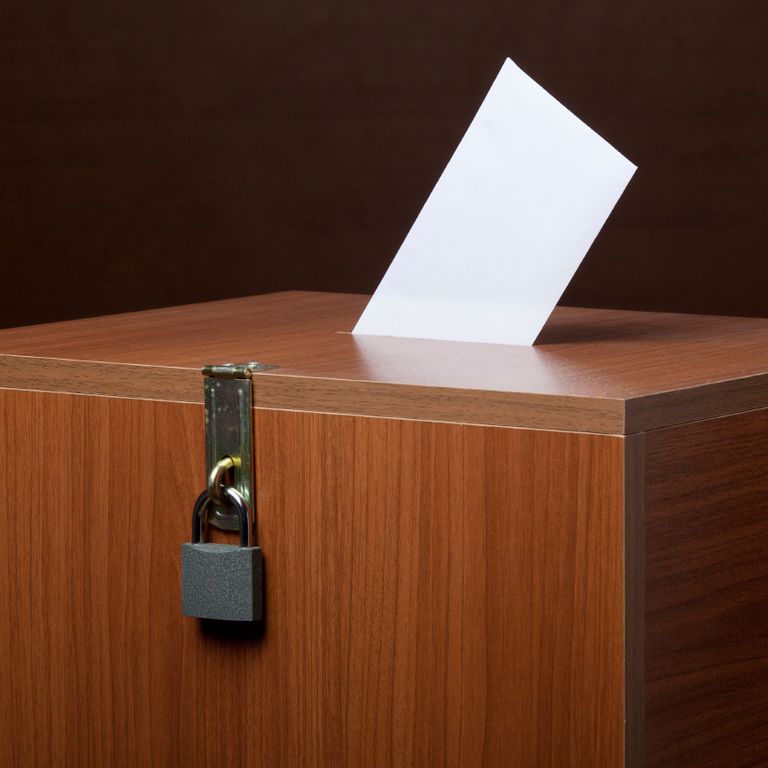feb
2025

Specializing and Why We Focus Only on HOA Elections
Reason why HOA Election Team doesn’t also offer property management, governing document legal services and other HOA projects unrelated to election
HOAs and property management companies increasingly have more options for professional election inspector services — and the options can quickly become confusing and a bit overwhelming. We are increasingly seeing new “hobby” election inspection businesses launched by people seeing this as a side-gig opportunity. Some may bring valid experience and attention to detail, but many others lack the election knowledge and attention to detail required to successfully manage even the most basic HOA election — let alone one that turns contentious and requires diplomacy and experience to navigate to a successful conclusion.
How do we know this? Because an increasing number of our new clients are coming to us after having aborted an election because their previous inspector failed to follow the required steps, and now their attorney is recommending they hire a more professional firm.
Another option for election inspection services that we increasingly see in the market are property management or real estate legal firms adding elections to their services. Obviously they see elections as a potential new revenue stream, and as a small business ourselves, we understand that. But for the HOA looking for election services, this seems like a poor choice, for a number of reasons. Looking at them separately:
- Property Management Companies Running Elections: First off, note that to comply with California law, an election inspector cannot be a professional that the HOA hires for other services. So, if you’re using a property management company to help run your HOA, you can’t use that firm for your elections. Same thing goes for the legal firm that drafts your governing documents, the account firm that keeps your books, your landscaper, etc… So, what HOAs face is the option to hire a separate property management company to just run their election. In the process, the HOA is giving that firm the names and contact information of every homeowner, the names of every board member, and often copies of all their governing documents and voting rules. And then they are hoping that the firm won’t use that in the future to solicit that HOA for full management services — something that is inherently much more lucrative than an annual or semi-annual election. Maybe that won’t be the case, but good luck with that.
- Real Estate Legal Firms: In my decades of experience in corporate business development, I’ve worked very closely with attorneys and have a huge amount of respect for their knowledge and ability to draft contracts and documents that will stand up in court and be defensible against legal challenge. But one thing that I haven’t seen as a strength of most legal professionals is the ability to consistently communicate complex processes in a manner that can be simply understood by laymen, or people who don’t also have a legal background. If fact, this insider language is so prevalent, that we have a term for it — legalese. And what happens when most of us encounter legalese, like when have to review terms & conditions for an online site? Well, most of us either don’t bother reading it because it makes no sense, or we just ignore it and disengage with the whole process. The same thing happens with HOA elections where the communication with property managers, board members, and homeowners is written in legal terms that for most regular folks is just confusing, unfriendly, and frankly disenfranchising. On the other hand, if you want an election with low homeowner participation and lots of follow-up “what-does-this-mean” questions for board members, hire a legal firm to run it.
How to hold board elections and increase voting quorum
Homeowner associations (HOAs) are everywhere in California and they play an important role in maintaining and managing those communities. One of the most important tasks that an HOA has is to hold regular elections for its board of directors. This ensures that the board is representative of the community and that it has the support of the homeowners.
There are a few things that HOAs need to do in order to hold successful elections. First, they need to make sure that they follow the proper procedures. These procedures will be outlined in the HOA's governing documents, but also dependent on a host of new California rules and regulations that will often take precedence over aging community rules. So it is important to carefully read and understand both your HOA rules and the state laws.
Second, HOAs need to make sure that they get the word out about the election. This can be done through a variety of channels, such as mailings, email, statements made in community meetings, posting notices on community information boards, and social media. It is important to give homeowners plenty of time to learn about the election and to make their plans to vote.
Third, HOAs need to make sure that the voting process is fair and transparent. This means that all homeowners should not only have the opportunity to vote, they need to know that their votes should be counted accurately. HOAs may want to consider using a third-party, expert HOA election company to help with the voting process.
Finally, HOAs need to make sure that they follow up after the election. This includes notifying the winners of the election and getting their commitment to serve on the board. It is also important to thank all of the candidates for their willingness to run for office. Also, look for ways to allow candidates who lost the election to still get involved. Many HOAs have non-elected committees or appointed teams to address specific projects. These can be great ways to expand participation and take the sting out of losing an election.
By following these tips, HOAs can hold successful elections that will ensure that their boards are representative of the community and that they have the support of the homeowners.
Here are some additional tips for holding HOA elections:
- Set a clear timeline for the election process. This will help to ensure that everything runs smoothly and that homeowners have enough time to get involved.
- Make sure that all homeowners are aware of the election and how to vote, and that these comply with the current state law. This can be done through a variety of channels, such as mailings, email, and social media.
- Create a fair and equitable voting process. This means that all homeowners have the same opportunity to vote, and that their votes counted accurately, properly recorded, and records are stored in compliance with the law.
- Promote voter participation. This can be done by making voting easy and convenient for homeowners. For example, you could offer early voting or absentee voting.
- Thank all of the candidates for their willingness to run for office. Even if your preferred candidate does not win, it is important to show your appreciation for the time and effort that all of the candidates put into the election.
By following these tips, you can help to ensure that your HOA elections are successful and that your board of directors is representative of the community.

apr
2023
jan
2023

Community expenses are through the roof - What can your HOA board do?
Homeowner associations (HOAs) play an important role in maintaining and managing communities. However, HOA fees can be a burden for homeowners. Currently, inflation, supply chain issues, and shortages in qualified labor have combined to drive up prices for nearly everything an HOA manages, from landscaping to insurance, roofing repair to the cost of power and water.
But there are still ways that HOA boards can help to reduce community expenses. Following are some tips to consider:
- Review the budget regularly. HOA boards should review the budget regularly and make adjustments as needed. This will help to ensure that the budget is accurate and that the HOA is not overspending.
- Negotiate contracts with vendors. HOA boards should negotiate contracts with vendors to get the best possible prices. Many costs are going up and competition in key areas is down, but try to negotiate where you can. This can save the HOA a significant amount of money over time.
- Outsource tasks. HOA boards can save money by outsourcing tasks that they do not have the expertise or resources to do themselves. For example, the HOA could outsource landscaping, pool maintenance, election services, or management. While there are times when the HOA can save money with a do-it-yourself approach, you'll want to protect yourself from board burnout with too many projects and to avoid costly mistakes.
- Encourage energy efficiency. HOA boards can encourage energy efficiency by offering rebates for energy-efficient appliances and lighting. They can also install energy-efficient fixtures in common areas.
- Hold community events. HOA boards can hold community events to raise money for the HOA. These events can be anything from bake sales to car washes.
- Get involved in the community. HOA boards can get involved in the community by sponsoring local events and donating time or use of facilities to local charities. This can help to build goodwill and support for the HOA.
By following these tips, HOA boards can help to reduce community expenses, put up a defense against rising costs and make HOA fees more affordable for homeowners.
How to increase HOA board participation
Homeowner associations (HOAs) are a vital part of many communities. They help to maintain and manage common areas, enforce community rules, resolve disputes, and keep the community solvent. However, HOAs can only be successful if they have active and engaged boards. And it's amazing how often HOAs struggle to find community members willing to commit the time to being part of an HOA board.
If your HOA is struggling to get board members, or if you're looking for ways to increase participation, here are a few tips:
- Make it easy to get involved. The first step to increasing board participation is to make it easy for people to get involved. This means having clear and concise information about the board and its responsibilities, as well as easy ways to contact the board and express interest in serving.
- Highlight the benefits of serving on the board. Many people are hesitant to serve on an HOA board because they don't know what it entails or they're worried about the time commitment. It's important to highlight the benefits of serving on the board, such as the opportunity to make a difference in your community, learn new skills, and meet new people.
- Reach out to potential board members. Don't wait for people to come to you. Reach out to potential board members and let them know that you're looking for volunteers. This could involve sending out letters, making phone calls, or even knocking on doors.
- Offer training and support. Once you've recruited new board members, it's important to offer them training and support. This will help them to be successful in their roles and make a positive contribution to the HOA.
- Celebrate successes. When the board achieves a goal or completes a project, be sure to celebrate their success. This will help to motivate them and encourage them to continue serving.
By following these tips, you can increase board participation and make your HOA stronger and more successful.

sep
2022
may
2022

Options for HOA elections - and the Pros & Cons
Let's take a quick look at some of the options available to homeowner's associations planning to run board elections in compliance with California state rules.
Option 1: Identify either 1 or 3 community members who are willing to voluntarily service as Inspectors of Elections.
Pros:
- Biggest one is that the only elections cost to the HOA will be for printing, materials and postage (assuming the election is done properly and there are no challenges arising perceptions of bias or missing deadlines.)
Cons:
- It may be difficult to identify the needed individual(s) willing to commit the time for running an election.
- Volunteers can start with much enthusiasm, but the HOA board election process now takes nearly 6 months and commits can change.
- Various elements of the election process need to be completed during specific timing windows, and these may conflict with volunteers’ plans for vacations, holidays, busy work periods, etc…
- Conflicts of interest: It can be difficult to find the needed volunteers who have no perceived conflicts for board elections.
- Privacy: The Inspector of Elections will need to be provided with the names and contact information for all homeowners. Additionally, they may need to investigate records to determine the legal ownership and voting rights of homeowners, and make a determination of whether those residents are permitted to vote. Are there any concerns about the protection of this type of information?
Conclusion: Weighing the pros and cons, you might think an HOA should never go this route. Not true, and in fact, I think this could be a very affordable option, particularly for very small HOAs where the balloting is manageable and it’s less likely for the elections to be contentious. For small HOAs with harmonious boards and residents, and with a willing volunteer looking to fill their free time – this may be the perfect solution.
Option 2: Hire a professional firm like HOA Election Team to serve as Inspectors of Elections and run your board elections from beginning to end.
Pros:
- Board elections are run properly to comply with state rules, reducing the need for board members and property managers to lose sleep over the process and allowing them to focus on more pressing issues.
- Community members often have greater confidence in election results, which can help reduce future aggravation from residents who previously felt shut out of the process.
- Properly run elections reduce financial risk to the community from community members who might protest the results.
- Potentially contentious decisions around voting rights are made by an impartial third party, applying your community’s rules and covenants, removing the conflict that can occur with neighbor vs. neighbor decisions.
Cons:
- There’s a cost to hiring a professional firm.
Option 3: Split the work of managing elections between a volunteer community member and a professional Inspector of Elections service.
Pros:
- Because some of the work is being done by a community member, you are likely to have somewhat lower costs for board elections.
- Board elections are run properly to comply with state rules, because you’re still using a professional service and following their schedule.
- Properly run elections reduce financial risk to the community from community members who might protest the results.
- Potentially contentious decisions around voting rights can be made by the professionals, removing potential conflict between community members.
Cons:
- It may be difficult to identify the needed individual(s) willing to commit the time for participating in running an election.
- Volunteers can add a little bit of risk with missing deadlines or not properly completing tasks. But working with a quality Inspector of Elections, like HOA Election Team, can avoid all these risks by providing clear direction, check in on deadlines and backups to head off any potential issues.
So, which option is right for your community? That depends on a lot of factors and can change over time as willing volunteers come and go, and boards become more contentious and elections more hotly debated. It’s definitely something worth discussing with your board. And please contact the HOA Election Team if you have any questions about how we might be able to help.
Inspector of Elections work-arounds - or maybe not
The recent changes in California rules for HOA board elections have inspired some really creative ideas for how to get around all the new requirements and restrictions.
One that stands out to me are HOAs looking for ways to avoid having to hire an outside firm to serve as their Inspector of Elections.
These HOAs often first try recruiting a community member to administer their elections. And while they may initially find a volunteer, these well-intentioned homeowners often backed out once they get the details on what would be required of them and became concerned about both the workload and the complexity.
So the next idea might be to see if any of the companies they already deal with (such as real estate law firms) might fit the bill. Or even if maybe their management company might be able to continue doing it, but under a separate name.
Well, first off, I’m not an attorney, but even to me that last idea sounds a bit dodgy and worth connecting with an appropriate lawyer to get their view before adopting.
Here’s the specific rule from California statutes: "The association shall select an independent third party or parties as an inspector of elections. … an independent third party includes, but is not limited to, a volunteer poll worker with the county registrar of voters, a licensee of the California Board of Accountancy, or a notary public. An independent third party may be a member, but may not be a director or a candidate for director or be related to a director or to a candidate for director. An independent third party may not be a person, business entity, or subdivision of a business entity who is currently employed or under contract to the association for any compensable services other than serving as an inspector of elections."
These rules are designed primarily to create an impartial election that isn’t unduly influenced by board members, board candidates, or any company that might directly benefit from someone getting on the board.
And that brings us back to the second option -- hiring your real estate law firm to run the election. Sounds good, but now who are you going to hire to draft any CC&R amendments that you might need and that could on be on the ballot? Is a law firm that both drafts the legal amendments and acts as the Inspector of Elections for those amendments violating the "may not be a person, business entity, or subdivision of a business entity who is currently employed or under contract to the association for any compensable services" requirement? And since they are likely not doing any of that work for free, does the HOA get any benefit from taking that risk?
Most HOAs seem to be coming to grips with the fact that it's cleaner to hire a Inspector of Elections firm and don't want to risk legal challenges that could blow up in their face and paralyze their client HOA with board elections being potentially invalidated.

feb
2022
jan
2022

HOA elections just got more complex - and costly
California has long had rules pertaining to how HOAs hold fair and open elections for board members and major initiatives – and for good reason. But starting in January 2020, the Golden State decided to add some complexity in the form of Civil Code 5110 pertaining to the new required role of “Inspectors of Elections.”
For those who haven’t heard, no longer will HOA boards and their management companies be able to run their own annual elections, which typically includes determining who is eligible to vote, counting the ballots and publishing the results. HOAs will now be required to identify an “Inspector of Elections” (there have to be either 1 or 3) who will perform that work in compliance with all state laws and HOA rules, is willing to store all past election materials for a period of time, and who is comfortable assuming whatever liability might come should the election results at some point in the future be challenged. Oh, and those volunteer “Inspector of Elections” cannot be a current HOA board member or someone running for the office (which makes sense), or someone related to a board member or candidate. They also can’t be your property management firm or any company your HOA is currently paying for some other services. And just in case these details don’t have your HOA members lining up for this plum volunteer job, new state rules for advanced notification to membership for every step of the election means that even the most basic balloting will now take close to 6 months.
So what will be the outfall? Simply put, most HOAs are now required to hire a new outside company to run, record and store the results from all elections. For the really big HOAs this might not be a big deal. This work is probably being done by their property management company and they can shift the work and cost of just the elections to a new firm. Of course there is always overhead and minimum project costs, so you’d be an extreme optimist if you didn’t expect that there will be at least some incremental cost increase.
But the HOAs that are going to really get pinched are the smaller ones, the ones that have truly been performing part or all of this work with member volunteers. Sure they will have the option of hiring a professional “Inspector of Elections.” But if you only have 30 or 50 homes in your HOA, there are no efficiencies and no scale that allows these services to make a profit without charging a high fee for each eligible ballot. So these are the HOAs that are going to get stuck with a big, new expense. We’re already hearing about property management firms afraid to touch anything election related and other confusing (and potentially costly) interpretations of the new rule.
Now none this assumes that the state wasn’t perfectly correct in wanting to enact new rules to ensure fair and open elections. Every HOA, whether big or small, will benefit from that. But we think these new rules were written in a way that will hurt the pocketbooks of many small and medium size HOAs, and may end up causing them to take steps to save money (like changing the timing of their board elections so they are no longer annual) that end up having unintended future negative consequences.
nov
2021

HOA fees and where they go
Every HOA is unique and has different costs and different things they pay for. Maybe yours is super upscale and includes swimming pools, tennis courts and cable TV. Or it could be more basic and the amenities are simple open green spaces, maintained streets and some landscaping. But regardless of the size, HOA fees primarily go to three broad categories of expenses:
- Reserve funds: These are the accounts that the HOA works to maintain to pay for anticipated replacement of fences, sidewalks, siding and roofs, streets – essentially everything the HOA owns or is responsible for. These costs are constantly rising and are hit with the double impact of higher replacement prices and aging communities that typically are seeing more need for updates.
- Maintenance: These are the monthly expenses for things like water and power, landscapers and gardeners, insurance on behalf of the HOA and members, and smaller repairs that spring up over the course of a year. No surprise here, none of these costs are going down.
- Management: Whether your HOA hires a management company to keep things running smoothly or depends on resident volunteers, there are expenses required for sending out homeowner communications, collecting dues, hiring contractors, resolving neighborhood and neighbor issues, setting and running required meetings, updating and distributing legal documents, and holding HOA board elections in compliance with your HOA bylaws. In a welcome surprise, in many cases this category has seen probably the least growth of the three listed expense categories.
